Leaky gut: the leaky gut syndrome
Dear reader,
In this specialist article we deal with the Leaky Gut Syndrome in a well-known holistic and evidence-based manner.
This clinical picture is expressed by a impaired barrier function of the small intestine wall [1]. As a result, pathogenic microbes and toxins get from the intestine into the bloodstream [2], which is often a trigger for a variety of complaints and diseases [3] is.
We clarify the following questions in this article:
- The Leaky Gut Test. How to find out quickly and free of charge whether you are .
- What exactly happens in the body? when the intestine becomes leaky?
- What are the real causes of Leaky Gut?
- Leaky Gut and Diet: Which foods should you avoid?
- Nutrition Tips: What foods should you eat if you have a leaky bowel?
- Which symptoms indicate a leaky bowel?
- What diseases can cause Leaky Gut Syndrome?
- Dr. Raphaël Perezand be „Nutra Digest“ in the test. Does it really help with Leaky Gut?
- Leaky bowel: What to do? Leaky Gut treat and heal with this therapy!
We, the non-profit Swiss association Parasitenfrei, produce professional, free videos on the subject of intestinal health. Now take a look at our video about “Leaky Gut” to get all information on the subject fast, high quality, entertaining and easy to understand :
(9.05 Min.)
This video is part of our Parasite Academy, a free online video course on the subject of “Parasites in humans” by the Swiss Parasite Free Association.
Click on the logo now, to get the entire academy for free to look at:

Leaky Gut: The Test
There is no examination which reliably proves a leaky gut syndrome. However, tests can be carried out that provide evidence of a leaky intestinal barrier:
- Mannitol test
An appropriate solution is drunk and then the urine is examined for a disaccharide and mannitol. If these substances are increasingly found in the urine, this is an indication of leaky gut [4]. - Zonulin blood test
If zonulin (the protein that makes up tight junctions) is found in the blood, this can also speak for a permeable intestine [5]. - Stool test
If the substances alpha-1-antitrypsin or secretory immunoglobulin A (sIgA) are increasingly found in the stool, this can also indicate leaky gut [6]. - Online test
The Swiss association Parasitenfrei has developed a medical online test with which you can get an expert assessment from home in a few minutes whether you have a leaky gut syndrome:
In order to carry out the test now, please state which statements apply to you:
1 I occasionally have diarrhea.
2 I suffer from gas.
3 I am often tired or suffer from chronic fatigue.
4 I have asthma.
5 I have bad skin or a skin disease.
6 I have frequent headaches or migraines.
7 I have stomach pains more often
8 I suffer from abdominal pain on a regular basis
9 I have food intolerances
10 I have one or more allergies
11 I have joint and muscle pain
12 I have in the past
13 I have often taken pain relievers such as aspirin or ibuprofen in the past.
14 I have had chemotherapy or radiation therapy.
15 I have taken antibiotics one or more times in my life.
16 I once had a disease caused by salmonella or noroviruses.
17 I have cereal products on my menu every day or almost every day
18 I consume dairy or dairy products
19 I eat meat from factory farming (sausage or meat from the conventional supermarket, meat from restaurants / snack bars) or have eaten it.
20 I eat fish that I buy in the conventional supermarket or have eaten it.
21 I eat or have eaten barn eggs.
22 I drink or have done alcohol regularly.
23 I have / had negative stress on a regular basis.
24 I have psychological stress around me or have done so for a long period of time.
25 I suffer from multiple sclerosis, lupus erythematosus, diabetes mellitus or rheumatoid arthritis.
26 I suffer from irritable bowel syndrome.
How is a permeable intestine created?
One of the main functions of the small intestine is to process the food it consumes and to transfer the nutrients into the bloodstream [7].
The content of the intestine itself is harmful for the body, as it consists, among other things, of foreign substances from food, special microbes and toxins (poisons) [8].
The intestinal wall acts as a barrier between intestinal contents and blood circulation, so that harmful substances are processed in the intestine in a protected manner and not get into the rest of the body [9].
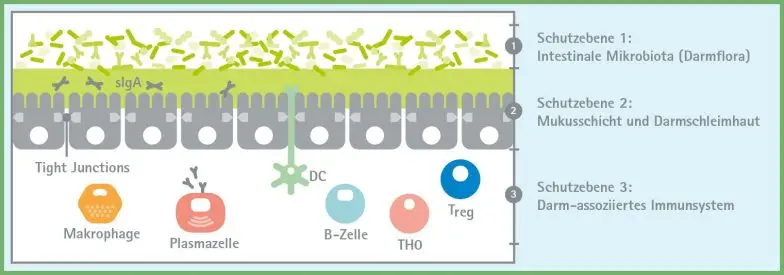
The intestine decides in an intelligent way which substances it excretes, which it converts and which it directs into the bloodstream. The most common mechanism is that the intestinal wall transports the substances that are to be absorbed through the intestinal cells. Basically, only strongly reduced substances, such as glucose, trace elements, vitamins, minerals, amino acids and fat cells, can get into the body [10].
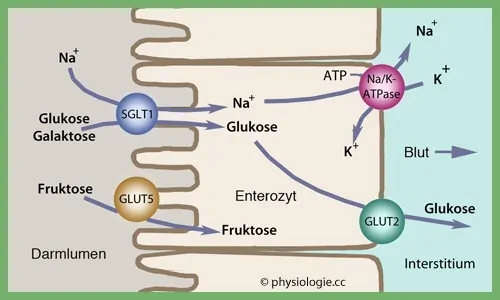
Since the intestinal cells are closely connected by protein connections, the so-called “tight junctions“, larger substances cannot pass through. In Leaky Gut Syndrome, the function of these connecting proteins is disturbed. This means that larger substances can enter the bloodstream, which the intestine would normally excrete or convert [11].
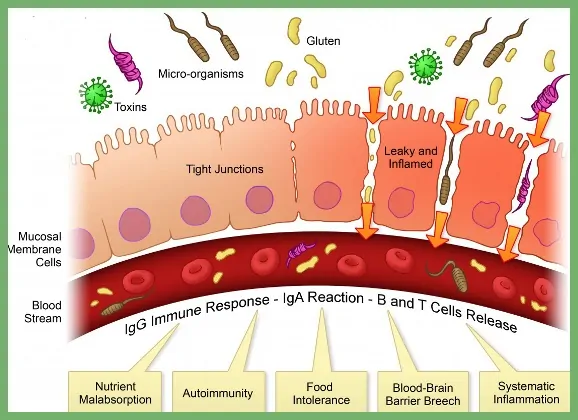
The term “leaky gut” as an independent clinical picture is not yet widespread in medicine and is more ascribed to alternative medicine [12]. Many doctors are familiar with this syndrome, but use different terms. They speak more of a disturbance of the intestinal permeability, of a disturbed intestinal barrier or an increased permeability of the intestinal mucous membrane [13].
However, the basic existence of this dysfunction is undisputed.
Leaky Gut: The Real Causes of Leaky Gut
Ursache 1: Parasiten
Many people suffer from parasites in the intestine, mostly without knowing it [14]. Whether you could also be affected can be found out quickly and free of charge using our online parasite test.
Parasites are life forms that derive a one-sided benefit from living with the host and damage their health [15].
In the intestine, parasites actively attack the intestinal wall in order to penetrate through the smallest holes into the bloodstream and thus optionally into all organs of the human body [16]. There they settle and spread. The consequence is a systemic parasite infestation [17].
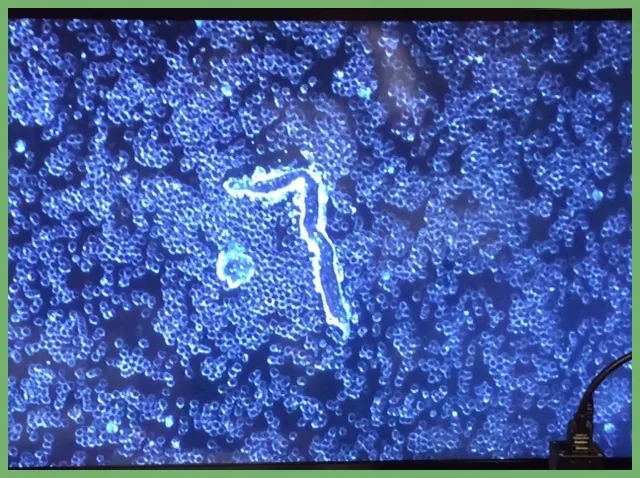
However, parasites can also passively trigger and promote the leaky gut syndrome. Intestinal parasites release toxins into the intestines, which are harmful to the „Tight junctions“ between the intestinal mucosal cells [18]:
Intestinal worms store environmental toxins such as aluminum or mercury in their bodies [19]. When released, these toxins can cause inflammation in the gut, which promotes a leaky gut [20].
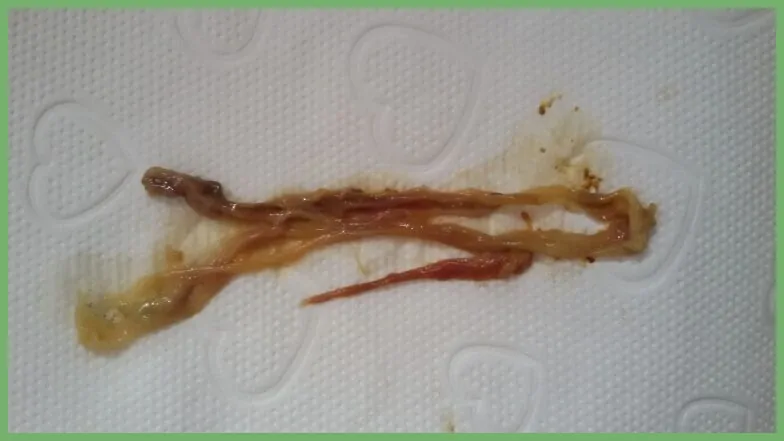
In addition, parasites phagocytize beneficial bacteria in the intestine [21]. These important microbes protect not only the intestinal mucosa [22], butalso inhibit “negative” intestinal bacteria [23]. Due to parasitic influence, the harmful bacteria multiply to a pathogenic level, which in turn has a negative effect on the permeability of the intestinal wall [24].
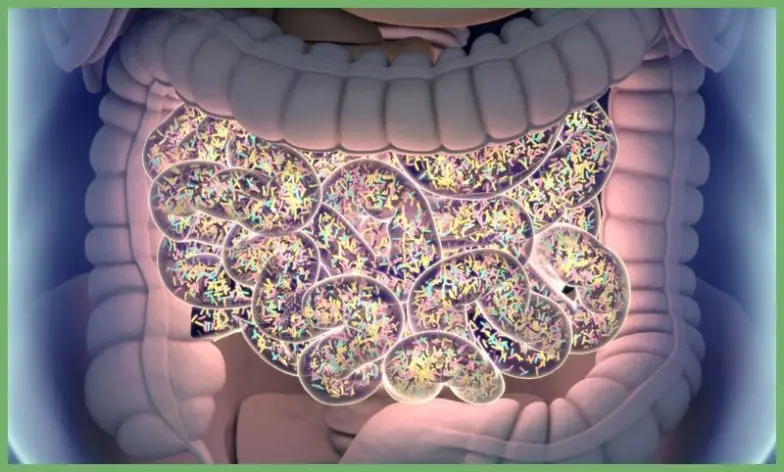
The parasitically induced intestinal fault symbiosis has another consequence:
Together with the parasites, the “negative” intestinal bacteria create a film of mucus, the so-called Biofilm [25].
cause 2: Biofilm
The Biofilm consists toxic mucus secretions of pathogenic intestinal bacteria and parasites [26]. So there is a poisonous film on the intestinal wall.
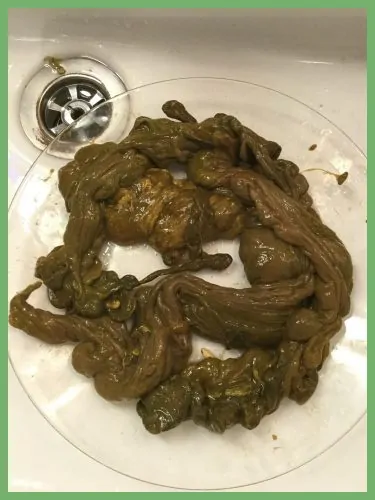
The permanent release of toxins from the biofilm damages the “tight junctions” [27]. In addition, the areas of the intestinal wall covered by this dry, which can cause further damage [28].
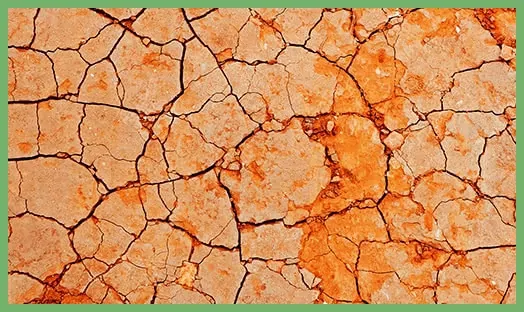
The biofilm enables harmful bacteria and parasites to survive in the intestine by protecting them from the effects of drugs and other substances that are harmful to them [29].
Cause 3: malnutrition
Certain foods can cause damage to the intestinal wall, especially with a corresponding predisposition [30].
These include:
- Trans fats, e.g. from fast food
- Foods that are difficult to digest (legumes, grains)
- Alcohol
- sugar

Any food that cannot be digested forms fusel alcohol [31]. These act as solvents on the tight junctions [32].
Because parasites kill positive intestinal bacteria, the food can no longer be sufficiently decomposed. Fusel alcohol forms, which dissolve the tight junctions.
Sugar damages the intestinal wall and promotes inflammation in the intestine [33]. In addition, he lets intestinal fungi grow, which in turn can promote Leaky Gut [34]. A high-carbohydrate diet with grains and sugar also promotes parasites in the intestines [35].
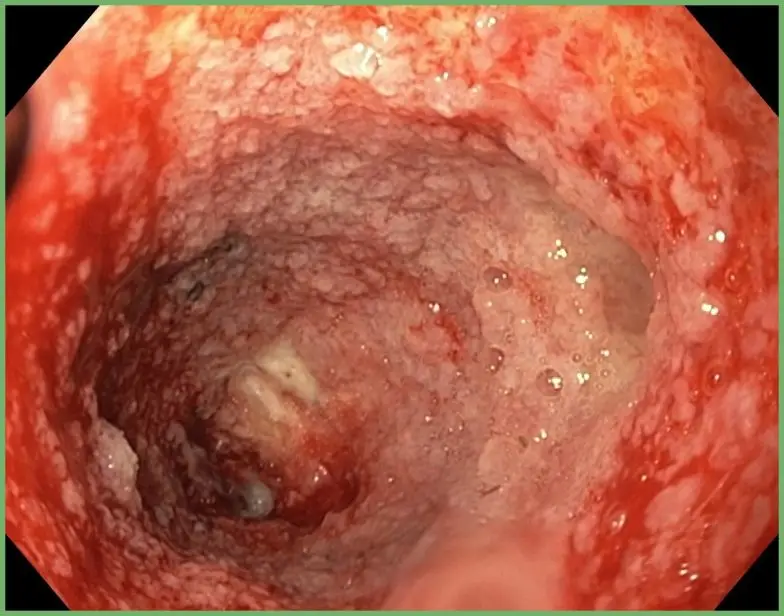
Parasites can trigger cravings and through the manipulation of dopamine promote malnutrition. We have compiled further information for you here.
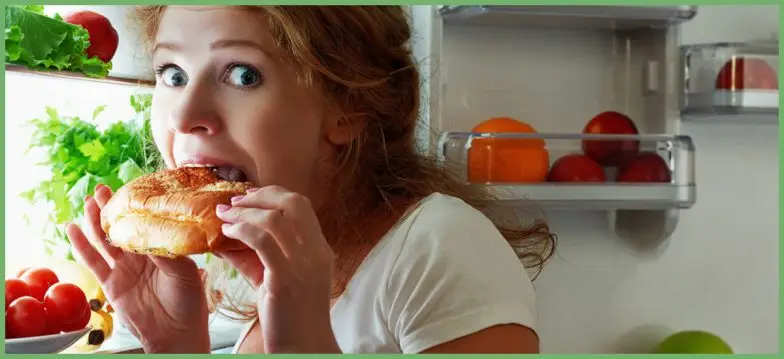
Pesticides in plant and animal foods inhibit “positive” intestinal bacteria [36] and thus promote “negative” bacteria and parasites in the intestine [37]. Among other things, health-promoting bacterial strains have the task of controlling parasite infestation [38] .

Cause 4: Environmental toxins
Through water, air, food and other factors, we ingest ever larger amounts of environmental toxins [39], which can cause damage and inflammation in the intestine [40].

According to Dr. Dietrich Klingardt represent environmental toxins like aluminum at the same time the largest growth factor for parasites [41].
Cause 5: Chronischer Stress
Persistent negative stress causes positive intestinal bacteria to a high degree perish [42] and promotes the spread of parasites in the body. Three mechanisms are responsible for the latter:
also supports the body
- Positive intestinal bacteria , the natural regulator of parasites, perish due to stress.

Parasites promote the release of cortisol in the body and thus put it in chronic stress [48].
Cause 6: Antibiotics
By taking antibiotics or passive exposure, e.g. by meat from factory farming , positive intestinal bacteria are inhibited [49]. This can lead to leaky bowel syndrome and the spread of parasites in it.
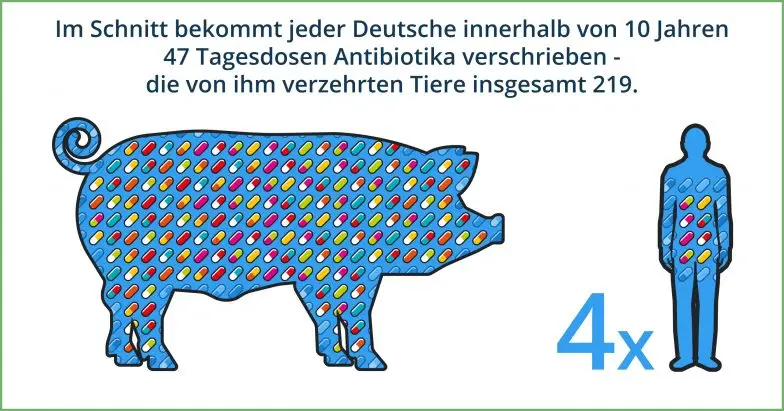
Parasites manipulate and in turn weaken the immune system, so that pathogenic bacteria can more easily cause disease. Doctors are inclined to prescribe antibiotics again [50].
Cause 7: Radiation
Radiation and electrosmog (e.g. mobile phone or WiFi) kill positive intestinal bacteria [51] and, according to alternative practitioner Alan E. Baklayan, represent one of the largest growth factors for parasites [52].
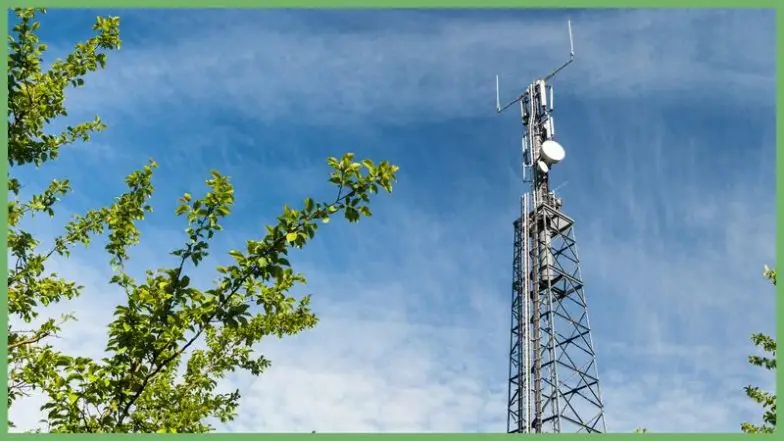
Conclusion: That is the cause of Leaky Gut!
The overall context clearly shows that parasites play a decisive role in every known cause of leaky gut syndrome. They damage the intestines actively, passively and through various other factors.
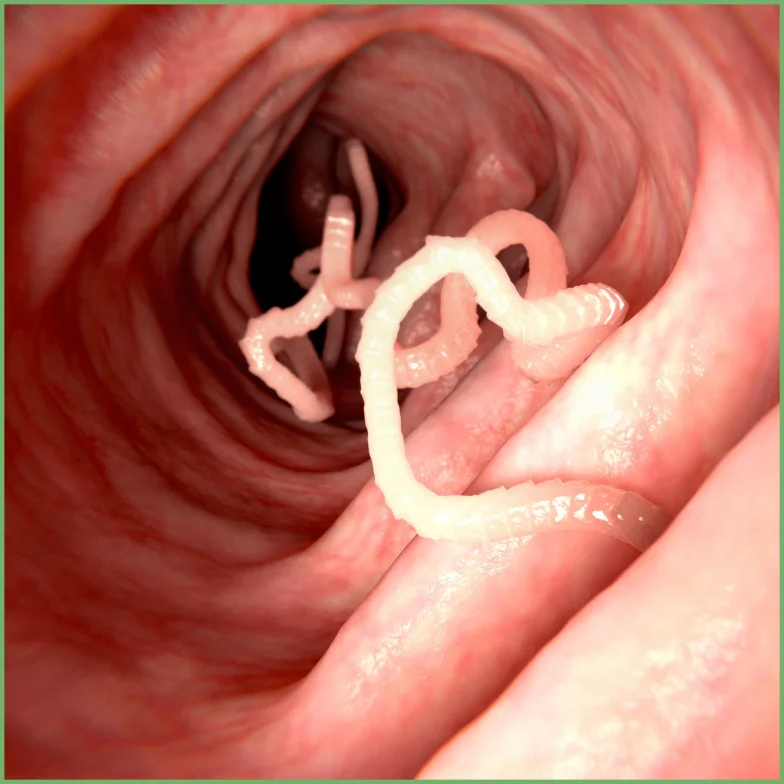
The empirical values collected and evaluated in our association show that a leaky intestine in all cases known to us by a Parasite treatment has been cured.
If parasites are removed sustainably from the intestine, the leaky gut closes as well.
Whether you have a parasite infestation can be found quickly and easily with our free parasite test. Please do the test now to detect an infestation:
Leaky Gut: Cause Diet - These Foods Lead to Leaky Gut
In addition to parasites, the diet is a major factor in the development of a leaky intestine.
Those foods and additives which studies show damage the intestinal wall and thus lead to leaky gut syndrome are [53]:
- Alcohol
- Coffee
- Sugar
- Gluten
- Aspartame
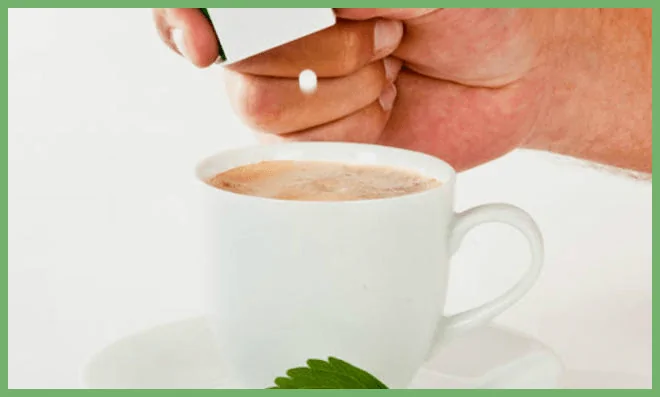
- Whey protein / casein protein
- Cereal products (especially whole grains)
- Legumes (beans, lentils, peas…)
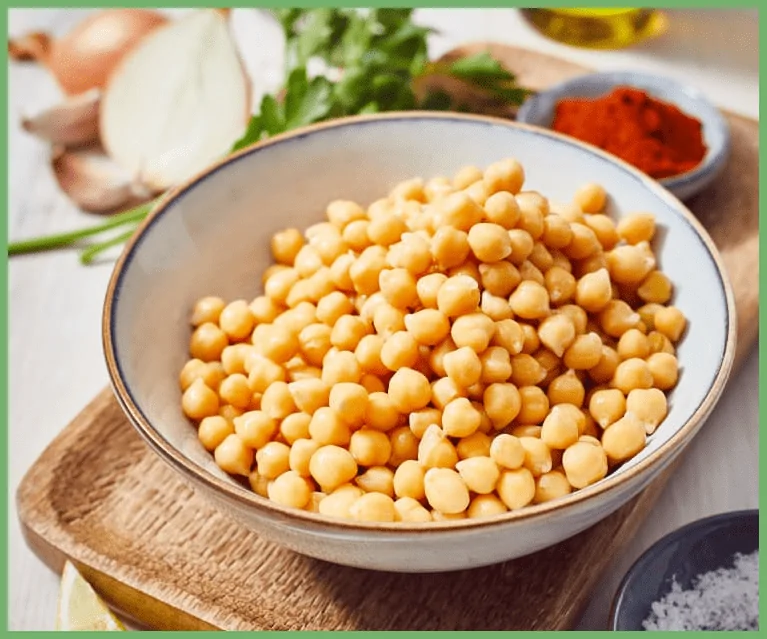
- Corn products
- Raw vegetables
- Meat and sausage from factory farming
- Meat from animals that have been given concentrated feed (maize, grain)
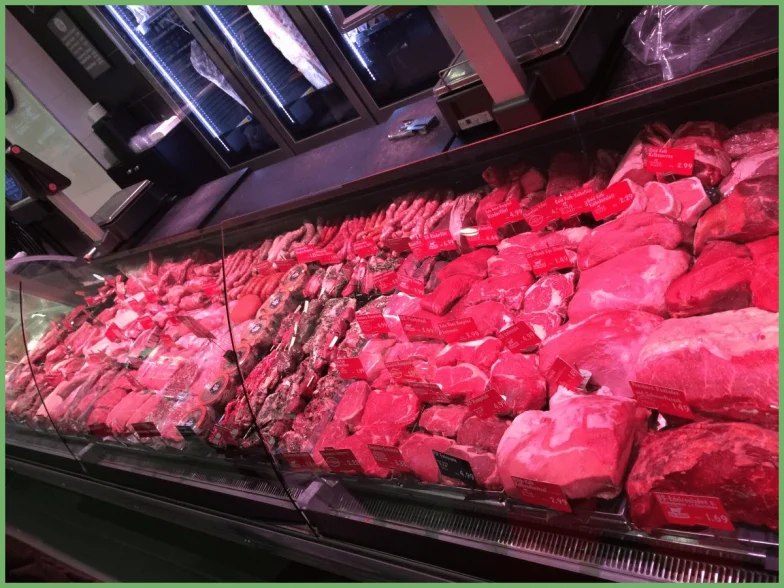
- Fish from conventional aquaculture
- Foods containing lectin and solanine (e.g. tomatoes, peppers, some nuts / kernels)
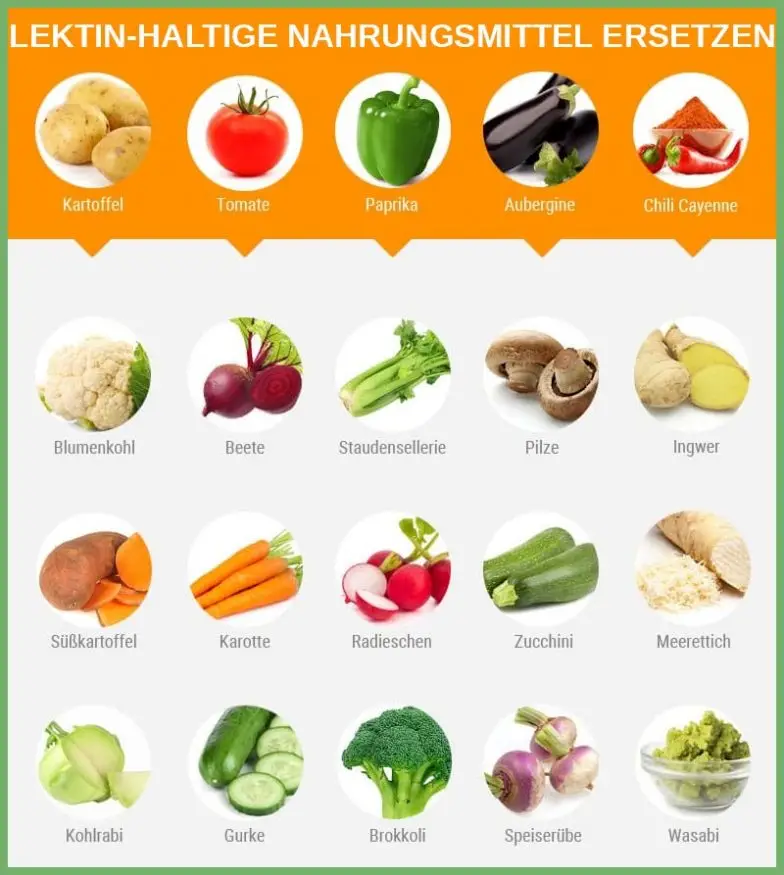
- Soy products
- potatoes
- Foods containing histamine (e.g. pineapple, chocolate, hard cheese, yeast)
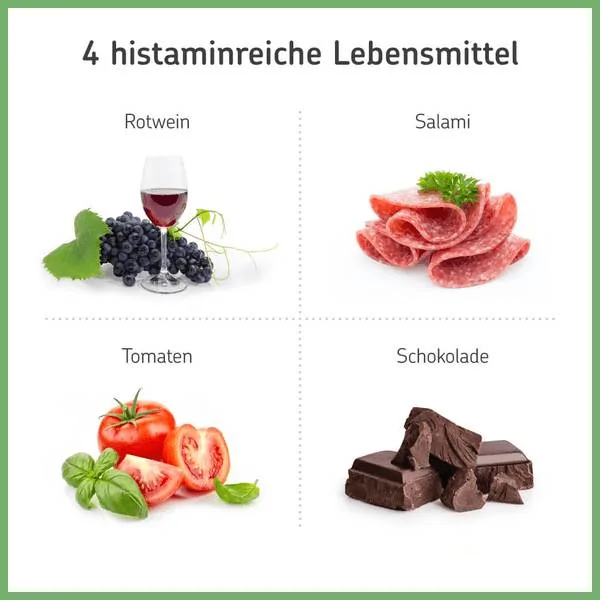
Diet tips for leaky gut syndrome
First and foremost, those affected should have a holistic parasite cure perform to the Root cause to fix the Leaky Gut Syndrome.
In addition to the Treatment of intestinal parasites correct nutrition is important for the healing of the holey intestine.
We generally recommend a ketogenic diet. Only very few carbohydrates (max. 30g / day), but many fats are consumed in this. Since the cells no longer receive glucose (made by the body from carbohydrates), they begin to burn ketone bodies (made from fats) for energy. The metabolism is in “ketosis“.
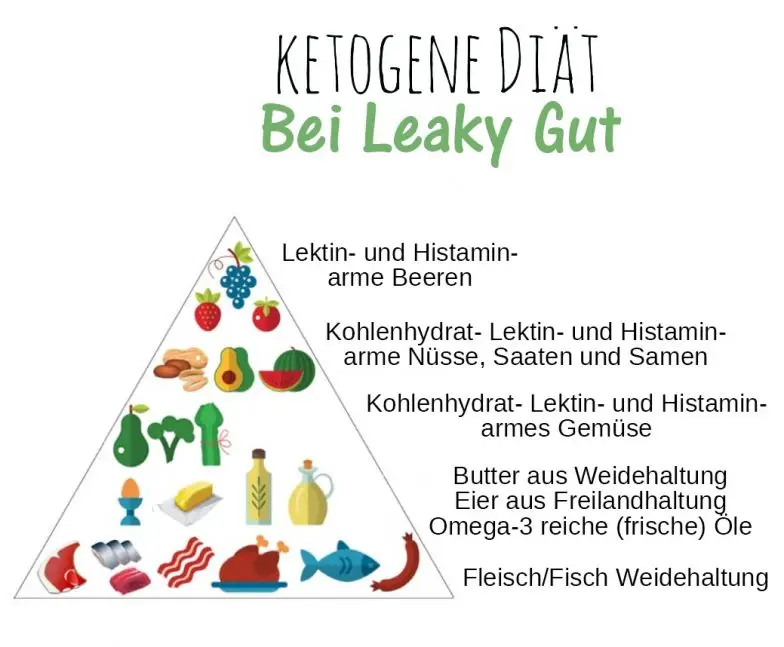
Foods that we particularly recommend at Leaky Gut are:
- Pasture broth (collagen can close tight junctions)
- Plantains / cooked bananas
- Xylitol / xylitol instead of sugar
- Yacon syrup as a sugar substitute (has a prebiotic effect)
- Soaked flax seeds
- Fermented food, e.g. “Kimchi” (has a probiotic effect)
- Psyllium husks
- Foods containing L-glutamine and omega-3
- Pasture-raised meat
- Raw dairy products from grazing
- Free-catch and clean-water fish
- Cabbage, cooked, of organic quality (e.g. kale)
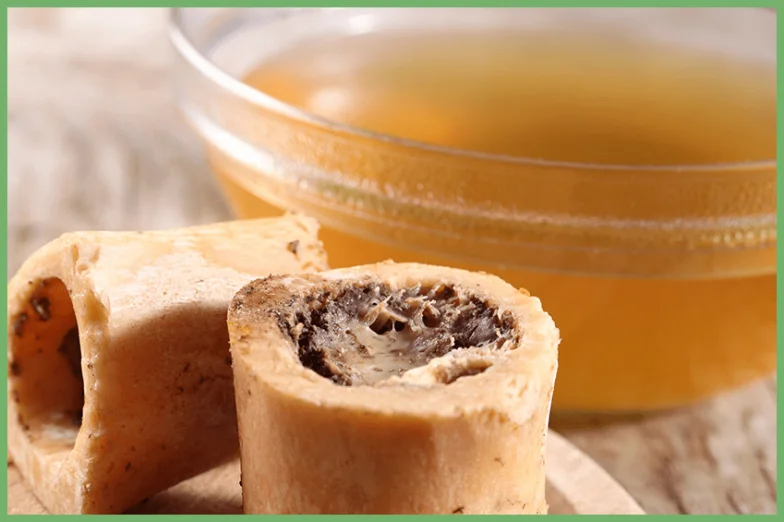
Leaky Gut: The Symptoms of Leaky Gut
- Regular diarrhea
- Flatulence
- Digestive problems
- Regular abdominal pain

- Skin problems
- Hair fall
- Skin inflammation
- Chronic fatigue / lack of energy
- Decreased efficiency
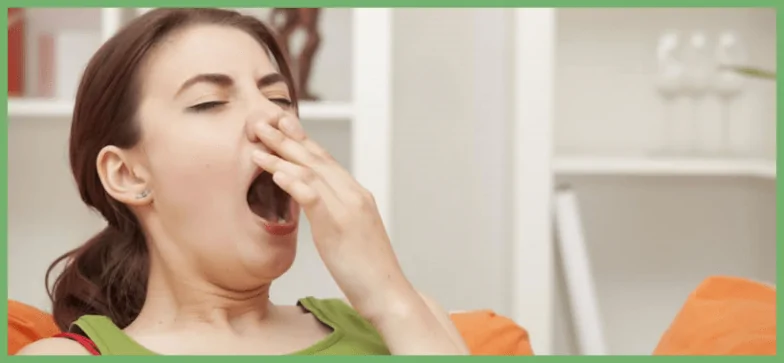
- Regular headache
- „Fog in the head“ („Brain-Fog“)
- Difficulty concentrating
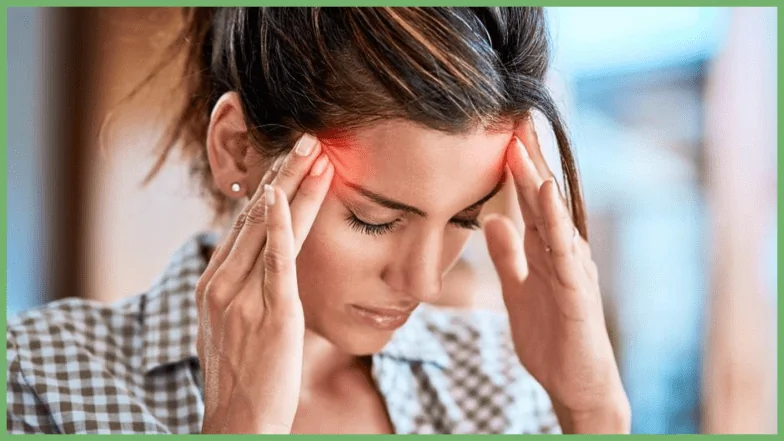
- Obesity
- Food intolerance
- Muscle and joint pain
- Muscle spasms
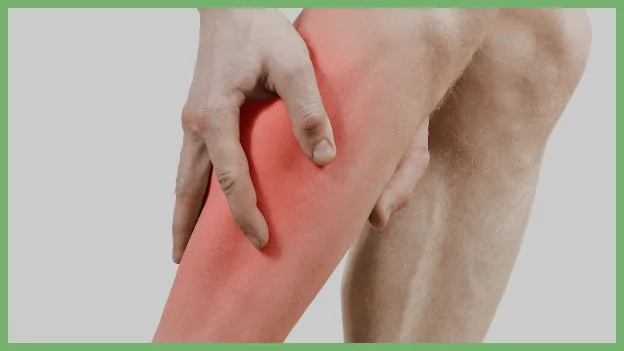
Leaky Gut: Possible secondary diseases
- Hashimoto
- Asthma
- Skin diseases
- Migraines
- Allergies
- Celiac Disease
- Depression
- Alzheimer’s
- Type I diabetes mellitus
- Obesity
- Crohn’s disease
- Ulcerative colitis
- Multiple Sclerosis
- Lupus erythematosus
- Rheumatoid arthritis („rheumatism“)
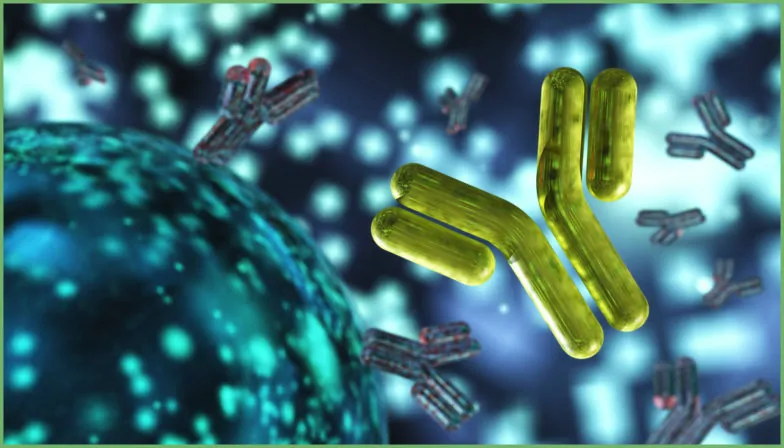
Dr. Raphaël Perez: Nutra Digest and Leaky Gut - Does It Help?
Since we are repeatedly asked whether the product Nutravya “Nutra Digest” by Dr. Perez has an effect on leaky gut syndrome, we took a closer look at this remedy:

1.) Testimonials
The positive reports on the manufacturer’s website were published with photos from a photo database. As a result, we have doubts about the authenticity of the reports. There are many negative experiences about Nutra Digest on the internet.
2.) The ingredients
The ingredients are Kombucha extract and artificial Vitamin E. This can not bring about a healing of the leaky gut. Synthetic vitamin E also contains mirror isomers, which are carcinogenic [54].
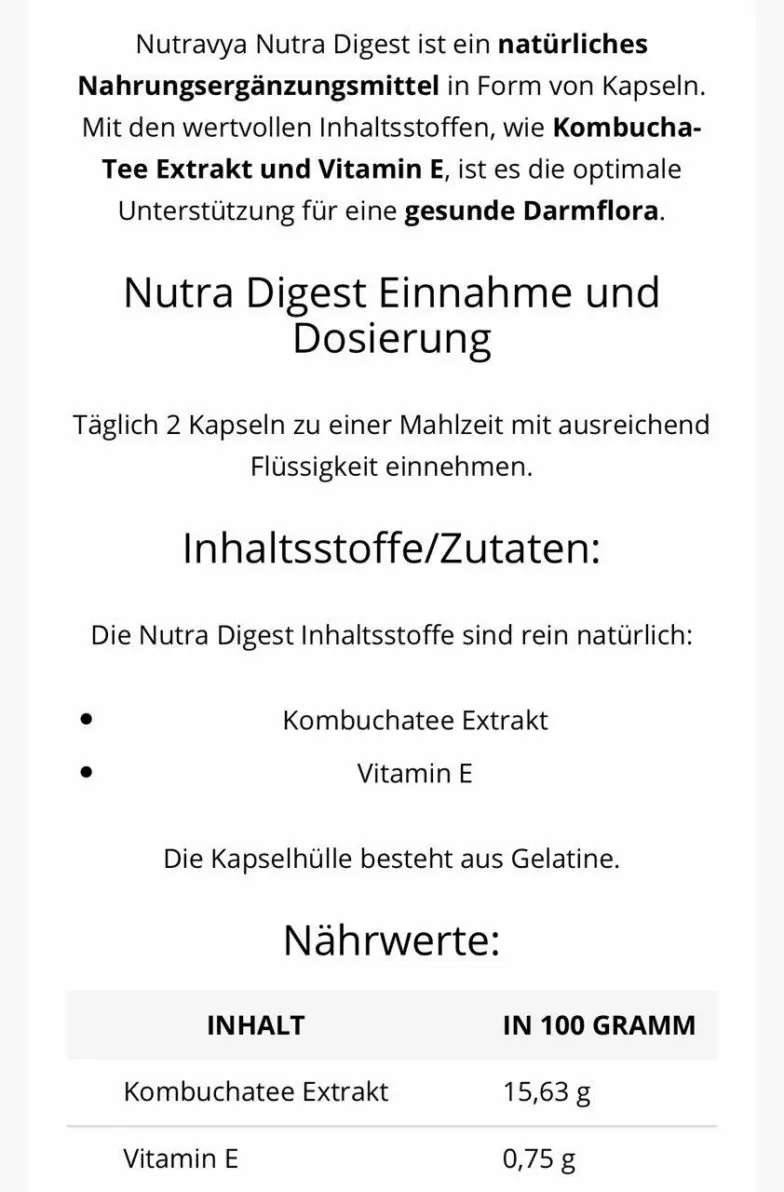
3.) The side effects
Many users report abdominal pain after taking Nutra Digest. This could be due to the poor quality of the product.
4.) The effect
It can no effect be detected.
5.) The seriousness
According to customer statements, there seem to be problems with order processing.

Treating and healing leaky gut: Leaky Gut Therapy
The first and most important step of a leaky gut treatment is the implementation of a holistic parasite cure.
You can find out what such a cure looks like and what you should pay attention to in our large parasite cure guide:
If performed correctly, this therapy removes the cause of the leaky bowel and the bowel can move into the healing phase.
This can be supported by the following measures:
- Implementation of the Diet recommendations from this article
- Exercise regularly (anti-inflammatory)
- Reduction of belly fat (anti-inflammatory)
- Ingestion of bentonite and MSM (accelerates the healing process)

Leaky Gut FAQ: Short question, short answer about leaky gut
Yes absolutely. It is important that the cause (parasites) is eliminated and then the intestine can be healed by itself or with the help of the right diet and nutritional supplements.
We recommend our medical Leaky-Gut-Online-Test.
The leaky gut syndrome describes a clinical picture in which toxic parts of the intestinal contents enter the bloodstream.
One Parasitenkur takes 6 to 12 weeks. It usually takes up to 12 months for the leaky gut to heal completely. However, only if the parasites have been permanently removed from the body, otherwise no cure is possible.
First and foremost, we advise you to rectify the cause. To do this, intestinal parasites in particular have to be eliminated. The intestines can then often heal on their own.
Here you will find a list of permitted foods.
Here see a list.
Yes – if there is a leaky intestine, lectins should be avoided. Foods High in Lectins:
- bread
- Corn
- Potatoes and potato products
- rice
- Pasta/noodles
- beans
- Legumes
- Soy
- Tomatoes
- Cucumbers
- Pumpkin
- Grain
- Vegetable oils
- Eggplants
- Hot peppers/chilli
- Pasteurized milk
- Sugar
Yes, there are good doctors who can be consulted if the intestine is leaky, e.g.
- Dr. Klinghardt
- Dr. Muss
- Dr. Pragnanz
- Dr. Breitenberger
- Dr. Widderich
- Dr. Carmine (Schweiz)
Food supplements are not absolutely necessary to heal the leaky intestine. However, they can be used in addition. We recommend the following supplements:
- Bentonite
- Zeolite
- Healing earth
- Probiotics
- zinc
- L-glutamine
- Antioxidants
- MSM
- OPC
- Aloe Vera
- Quercetin
- humic acid
Ripe bananas and plantains are good for the intestines. Unripe bananas, on the other hand, damage the intestines and can promote leaky gut.
The best intestinal yogurt is raw, fermented goat yogurt.
Yogurt is good for the intestines because it contains positive intestinal bacteria.
Teas made from:
- Angelica root
- Caraway seed
- fennel
Alcohol can damage the intestinal wall directly. That is why it should definitely be avoided in the case of leaky intestines.
We advise against all grains, including oatmeal, in the event of a leaky intestine.
Nein, es gibt keine sichere Diagnose, sondern nur Anzeichen für das Leaky Gut-Syndrome.
No, a cure for Leaky Gut Syndrome is complex. Medicines can therefore not help.
Yes, there are some illnesses that can be caused by leaky gut syndrome. Here we have published an overview.
The proteohormone leptin has no known correlation with leaky gut.
In our association we have nutrition plans and even a cookbook. Comment below this article if you are interested.
A quick healing is not possible. A genesis can be expected after 12 months at the earliest.
No, the damage to the intestinal wall is microscopic.
We have made the experience that Leaky Gut can be cured if the cause is eliminated and patience is brought along. However, LG cannot be remedied quickly and hectically.
Our experience is that homeopathy has no effect on leaky intestines.
Nutritional therapy can support the healing of the leaky gut if the cause (often intestinal parasites) has been eliminated beforehand. Proper nutrition is a cornerstone of the healing process for leaky gut syndrome.
“Leaky Gut: Healing the Permeable Intestine” by Dirk Schweigler offers good advice. Combine this information with a parasite cure. Internationally we recommend the book “Colon Leaky Gut” by Dr. Camilleri.
We recommend a ketogenic diet that is poor in lectin, solanine, and histamine
Yes, if children are malnourished, it is possible. A change in diet for the child is required.
Yes, the best home remedies at Leaky Gut are:
- Fermented foods
- bone broth
- Healing earth

